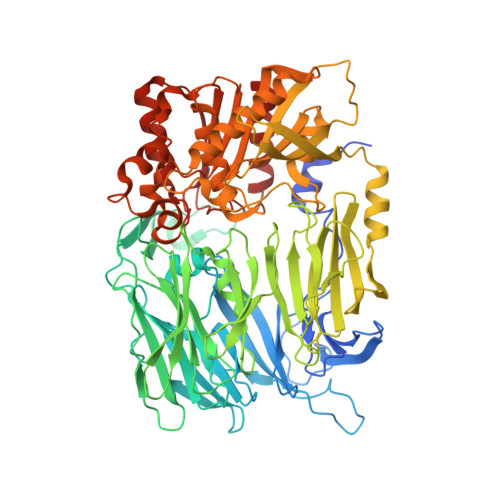Microbial-host-isozyme analyses reveal microbial DPP4 as a potential antidiabetic target.
Wang, K., Zhang, Z., Hang, J., Liu, J., Guo, F., Ding, Y., Li, M., Nie, Q., Lin, J., Zhuo, Y., Sun, L., Luo, X., Zhong, Q., Ye, C., Yun, C., Zhang, Y., Wang, J., Bao, R., Pang, Y., Wang, G., Gonzalez, F.J., Lei, X., Qiao, J., Jiang, C.(2023) Science 381: eadd5787-eadd5787
- PubMed: 37535747
- DOI: https://doi.org/10.1126/science.add5787
- Primary Citation of Related Structures:
7Y4F, 7Y4G, 8HAY - PubMed Abstract:
A mechanistic understanding of how microbial proteins affect the host could yield deeper insights into gut microbiota-host cross-talk. We developed an enzyme activity-screening platform to investigate how gut microbiota-derived enzymes might influence host physiology. We discovered that dipeptidyl peptidase 4 (DPP4) is expressed by specific bacterial taxa of the microbiota. Microbial DPP4 was able to decrease the active glucagon like peptide-1 (GLP-1) and disrupt glucose metabolism in mice with a leaky gut. Furthermore, the current drugs targeting human DPP4, including sitagliptin, had little effect on microbial DPP4. Using high-throughput screening, we identified daurisoline-d4 (Dau-d4) as a selective microbial DPP4 inhibitor that improves glucose tolerance in diabetic mice.
- Department of Physiology and Pathophysiology, School of Basic Medical Sciences, State Key Laboratory of Female Fertility Promotion, Center for Reproductive Medicine, Peking University, Beijing, China.
Organizational Affiliation:
















